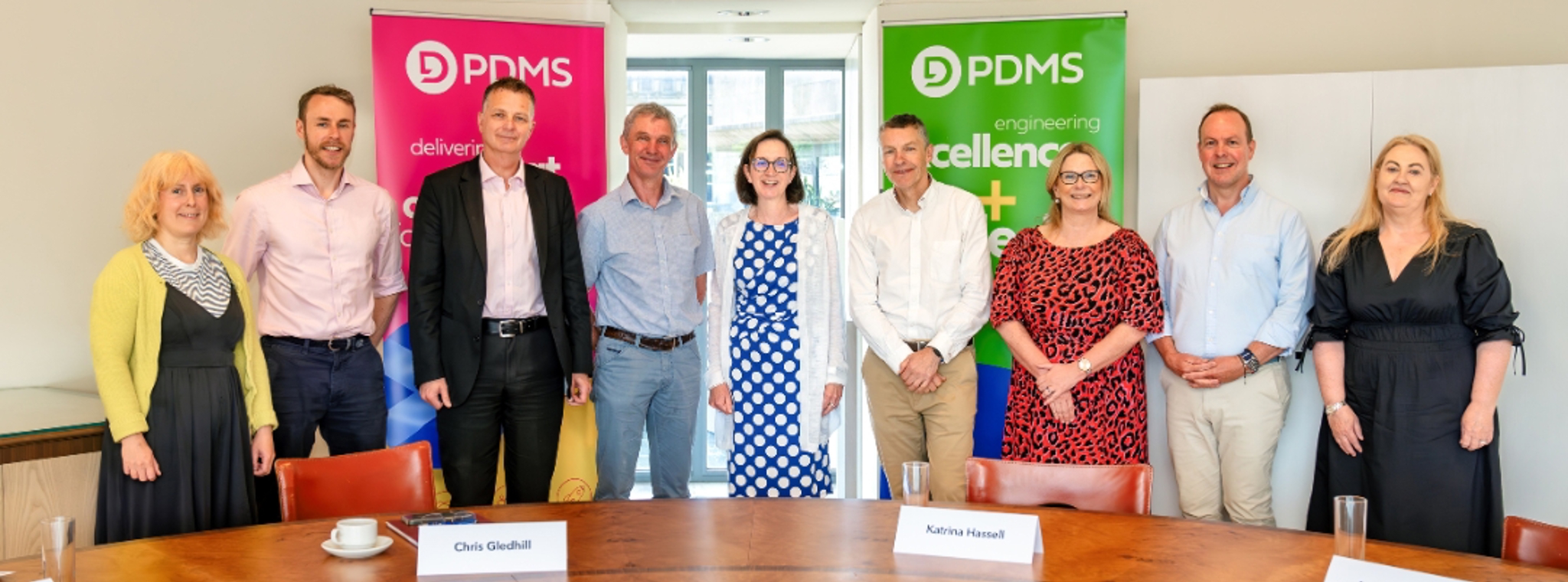Scotland Data Futures Forum: Finding the golden thread
Graham Lironi, Co-founder and Director of Liquorice Media, reports on our second Data Futures Forum at the National Museum of Scotland in Edinburgh.
Chaired by Alison McLaughlin, the roundtable discussion covered how we can align purpose, priorities and processes to digitally deliver on public services.
Chair: Alison McLaughlin - Freelance Consultant and previously Chair of ScotlandIS/Director of Digital Transformation at the Scottish Government
Participants:
- John Campbell - Digital Transformation Programme Director, Historic Environment Scotland
- Keith Dargie - CIO/DO, Crown Office & Procurator Fiscal Service
- Mary Docherty - Head of Concessionary Travel & Integrated Ticketing, Transport Scotland
- Chris Gledhill - Chief Executive, PDMS
- Katrina Hassell - Chief Officer for Business and Digital, North Lanarkshire Council
- Nigel Ironside - Head of Digital Services, Scottish Prison Service
- Shona Nicol - Head of Technical Data Policy, Scottish Government
- Tom Wilkinson - Chief Data Officer, Scottish Government
Chair Alison McLaughlin began the discussion by noting that the public sector response to the Coronavirus pandemic brought together a diverse range of organisations from across central and local government, health, education, justice, and innumerable other agencies, all united by a common cause.
This resulted in some phenomenal achievements and seemed to foster a culture of urgent action and collaboration, rather than one dominated by risk aversion and process.
Since that threat has abated, some might suggest that traditional cultures and silo-based working practices have started to take hold again and stifle that collaborative culture which achieved so much in so little time.
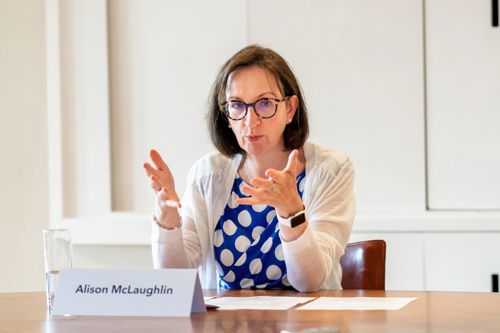
Alison McLaughlin
So, if it takes a crisis to provide the impetus for collaboration and co-innovation to take hold, she asked whether we recognise the ‘financial crisis’ that we’re all facing as just that, a crisis? If so, how do we respond? How do we successfully align public sector priorities and processes to enable successful collaboration, co-innovation, and service delivery?
She began by asking the participants what the current collaborative culture looks like within their own organisations. What are the barriers to greater partnership working, how could they be addressed, what would they like to see change and what can they control?
Tom Wilkinson noted that there were some cultural barriers to collaboration for the Scottish Government and UK civil service with a fundamental tension between the accountability and responsibility mechanisms.
This, in turn, drives siloing and clearly delineated boundaries and acts as incentives for leaders to not care about anything not explicitly in their remit, which makes it difficult for serious amounts of time to be allocated by staff to anything that hasn’t cascaded to them through conventional reporting lines.
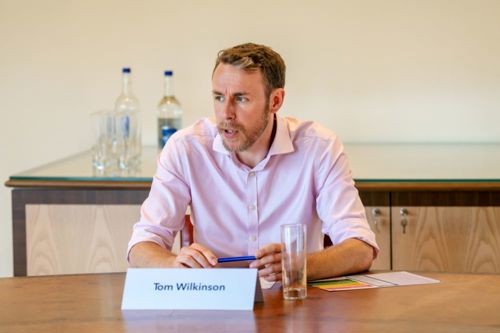
Tom Wilkinson
“That being said, there is a mission at the Scottish Government to be more agile, to broaden the spans of control and other changes that might help break those silos,” he said.
“But finance is going to be the challenge for the foreseeable future. Where resources are limited, it’s going to be even harder for leaders and managers to allocate resources to something which is outside their explicit remit because it involves collaboration with others.
“And staff are going to be stretched to the point where finding time to just stay aware of what’s going on elsewhere is going to be even harder. Some smart document technology might help make what’s there more visible across departments, but it’s going to be a difficult balance given the pressures on resources.”
Agreeing, Katrina Hassell observed that everyone was much more enabled to collaborate during the pandemic because many services were suspended, and staff repurposed into maintaining critical community services. But as soon as full-service delivery resumed, the usual pressures returned, and capacity was no longer there.
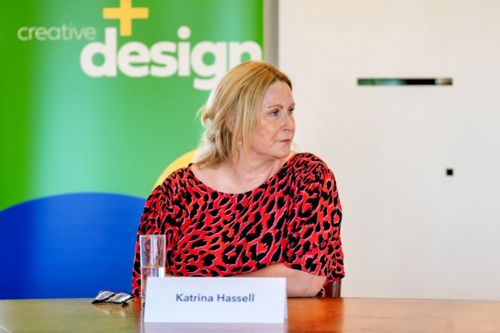
Katrina Hassell
“We do try to collaborate and have various pilots underway and a lot of dialogue with the NHS and NSS, seeking to ensure that we capitalise on various projects they’ve done and vice versa,” she said.
“But over the last year we’ve found it increasingly difficult to make the time to engage and do that. Staff are under pressure, and it will come down to money. In local government we’ve got very heavy financial targets and all we’re thinking about is how we can reduce our FTE (Full-Time Equivalent) and, if we reduce our FTE, what will we not do?”
Nigel Ironside said that the same issues apply to the prison service, which is about to publish its five-year corporate plan, which includes digital strategy as a core component, subject to budget availability year-on-year.
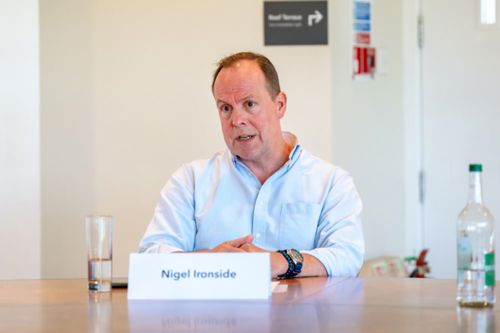
Nigel Ironside
“Now there is a much more ready recognition that there is a digital footprint for every project that the business wants to achieve,” he said.
“But hugging onto old performance indicators and legacy systems mean that that is still very much a transitional effort to transfer from where we were before into the new world of cloud hosting and new operating platforms and getting people to understand them.
“We’re dependent upon collaboration with justice partners, health partners and third sector partners – all of them want a piece of our digital pie and that costs money, so who takes the responsibility for that? All digital platforms these days are As a Service.
The days of buying a licence have long gone, so there’s a challenge around recognising that and strategically saying ‘where can we place that ownership and how do we provide access to services to allow business as usual’ while recognising there’s not a bottomless pit of money to be able to do so?”
Shona Nicol agreed, suggesting that while the expectation from citizens on the ground was that public sector organisations were all collaborating on issues such as health poverty, she questioned whether such collaboration was in fact happening.

Shona Nicol
“How we manage information in the public sector and how we talk to each other about projects can make that really difficult, whether or not we’re collaborating,” she said.
“We might not be able to collaborate on everything, but how do we make sure that we all know what’s going on in a particular geography or sector?
“We’ve set up some communities of practice within some areas with the idea being that we don’t want everyone to start from scratch. We don’t want every organisation to think it has to map out what that landscape looks like or have to understand the different interconnections.”
John Campbell suggested that it was all about the culture at leadership level and that, whenever data is discussed, a glazed look comes over the eyes of leaders.
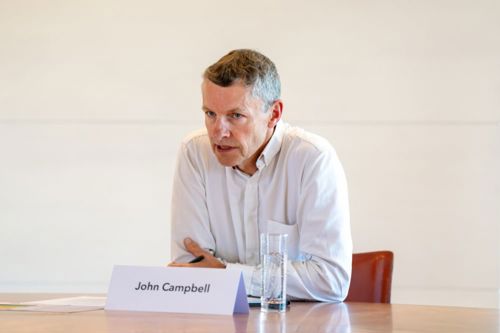
John Campbell
“I don’t think we show the value or the opportunity of data and that’s where the whole culture breaks down,” he said. “It’s up to us to show the opportunity to the top table and say, ‘it’s not a ‘maybe,’ you just need to do this.’ Demonstrating value and opportunity to leadership can change the culture.”
Mary Docherty agreed that leaders need to be persuaded to value what data can provide, but moreover to have the desire, arguing that we will only see the desire at the top level if we understand the value of whatever that commodity might be to us.
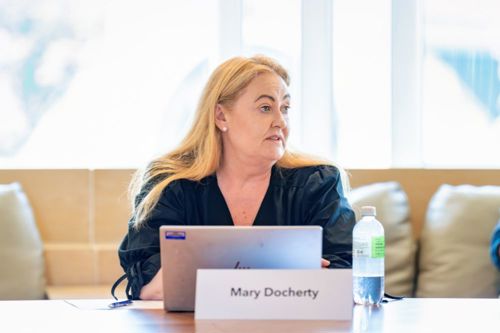
Mary Docherty
"We're having to deliver against a landscape which is extremely fiscally challenged. Let's move away from protectionism, working in silos, and let's open up that wealth of experience and expertise that prevails within the public sector and use it." - Mary Docherty
Keith Dargie agreed that the need to deliver improved outcomes with less is a common theme as we face financial challenges, and that the expectation to collaborate and innovate, not just within the organisation but at a system level and at a national level, is challenging.
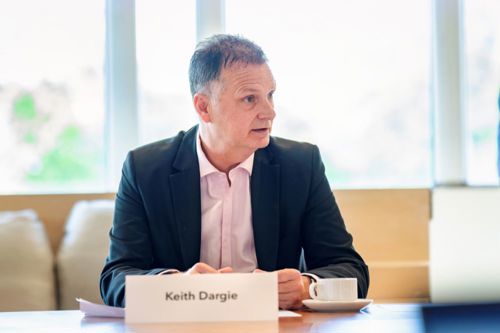
Keith Dargie
“It’s critical that digital is business and business is digital,” he said. “Innovation and strategic opportunities driven by data can help overcome those challenges.
“It’s about driving strategic vision with digital technology at the core, offering up innovation and opportunities and getting that into your strategic plan. Then it’s about demonstrating business value, and that’s where the challenge about capacity and resource comes in.
“That drives the culture of innovation in business areas: digital teams, partners, stakeholders working together on a clear goal and not taking significant years to deliver things.
Try to break down to something more manageable and you get that demonstrable value, you gain momentum, you gain support and that helps drive collaboration with delivery at the same time.”
Chris Gledhill noted that the silos that people operate within are resilient to change and don’t map well to the kind of information silos you might want to create if you want to be efficient, so there’s no real understanding of the cost of that inefficiency.

Chris Gledhill
“There’s also a difficulty where costs and benefits are not within the same organisation,” he suggested. “When you have an opportunity to use information or a system held by another organisation which could make things more cost effective, there’s no budget or opportunity to do that in our structure because people are working in silos and there’s no structure for sharing budgets and outcomes.
“And nobody articulates the cost of ineffective data management. We should be able to say that this is a cost that we would benefit from addressing. It doesn’t really matter how we do it, but we should see that as a clear-cut cost saving opportunity, the benefits of which will come.”

Nigel Ironside addressing the group
Alison McLaughlin asked how we ensure our organisations have the skillsets required to implement data standards which enable the effective sharing of data that can be used in a meaningful way to improve services and drive efficiencies.
Keith Dargie commented that the justice system has benefited from a long-standing, structured set of standards that’s allowed data to be shared for many years that’s still useful and can be built upon.
“It’s data that’s driving innovation in services,” he said. “It’s about getting information in the right place at the right time. It’s about product value and output, service delivery and getting information flowing across the system in an outcome-driven way.
“Standards is a big topic and it’s important that we collaborate, share information and, at the same time, develop standards and have more openness about sharing information without creating one big super data set.
“It’s about individual organisations being collaborative making differences at service citizen level. To do that we need to share our information, so standards are important but it’s innovation in service delivery that’s driving collaboration.”
Nigel Ironside agreed that data is driving change and that data identity is key to his organisation, which, as it evolves and tries to do things differently, is drafting new data and evidence strategy.
“Very few organisations seem to have a formal data strategy and that’s surprising, particularly given that we’ve been going through digital transformation,” he observed. “It’s important that you know what you want your outputs to be.
“Sharing with other agencies is key for us going forward. We want to have an open data source. That whole idea about being able to reach in and get what you need is important, but we’re quite a bit away from where we set that data environment appropriately and be assured that what we’re recording and providing is correct.”
Katrina Hassell said that, contrary to what we all think, technology is not the answer.
"It comes down actually to good specification, good quality straight off, making sure your information's accurate and everyone understands it. People understand that they need data to be able to deliver a service, but they really don’t understand the importance of it, making sure that it’s accurate and for what it’s used." - Katrina Hassell
"We’re definitely finding it challenging. I would love to have a good data standard but, for now, it’s not working for us.”
Mary Docherty noted that the 2019 Transport Act introduced open data standards for transport operators which will feed into the digital data transport service project. This will be a first in the UK and all data has to be accurate.
"We talk about digital as an enabler. It's about understanding. It's people. It's process. Let's use digital to enable that. We are collaborating with other transport organisations across the UK, but it's still a work in progress."
John Campbell said that his problem with standards is that there’s just too many of them.
“We can get too hung up on standards to the point that we don’t know if the data standards are appropriate to what we’re trying to do,” he argued. “And I can see why leadership glaze over. You mention ‘data’ and that’s bad enough, and you mention ‘data standards’ and that’s worse.”
Agreeing, Shona Nicol said that there’s so many standards that it can feel overwhelming.
“Everyone knows there’s lots of standards out there and everyone knows that they should be doing this, but where do you start and how do you have those ‘first step’ conversations and where can you use technology to help with this?” she asked.
In response to Ms McLaughlin’s query about whether we still need data standards, Ms Nicol said that there were many examples of where a lack of standards has cost the public sector a lot of time and energy.
“During Covid, when we were trying to join together local authority and health data but didn’t have UPRNs, local authorities spent a lot of time address matching and we shouldn’t be in that situation,” she said.
“You can have good technology to do address matching, but you won’t get anywhere near 100% so there’s never going to be a technological answer to that. You need standards in place in all of these different organisations that share data.
We’ve got many different examples of where standards haven’t been in place, and it’s made data sharing and the re-use of data much harder than it should have been.”
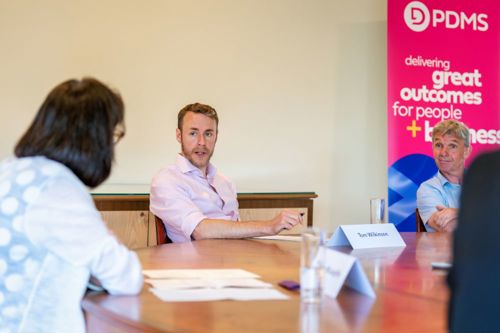
Alison McLaughlin, Tom Wilkinson and Chris Gledhill
Tom Wilkinson said that standards are not something that can be done away with and that he sees the challenge as one of finding a balance between standards and what digital technology allows us to do.
“It's easy to fall into an architectural purist perspective where everything needs to be designed meticulously upfront, but I’ve never seen a situation where that opportunity presents itself,” he said.
“At the same time, I’ve never seen a situation where data models left to develop organically didn’t lead to headaches down the line. So, the question is how to strike that balance between standards and freedom to develop data models organically.
"Key to that will be collaboration. Making sure that how data models are developing between different organisations is visible. And making sure that resource holders are sufficiently aware of the value of this, and that across public sector organisations, data architects understand the challenge, maintain those lines of communication, and use that information for what their organisations are doing."
"I'm sure technical solutions are involved too but having the data itself discoverable is needed before you can start to rely on being able to compare data models between different set ups. Our strategy strands are discoverability first, then consumability, then more consistency.”
Keith Dargie said that standards are critical, and we need to develop a strategy with political leadership acknowledging that data, innovation, and technology will improve the way the country operates, delivers services, and modernises.
“It’s a strategic vision, not just a data strategy, requiring an organisation to think about discoverability,” he said.
“That might drive organisations to think differently and to think about building a new solution to get the business value and the service delivery transformation. We do have to share or collaborate or nurture our data and that will take a long time.
"It's all about the outcomes, with business value being the driver, but we need that strategic vision. It’s not a rigid strategy, it’s a framework. Then let evolution develop new ways of working, data sharing and collaboration to deliver services in a modern way and, hopefully, the two will align somewhere along the line. It’s about building that momentum.” - Keith Dargie
Tom Wilkinson suggested that this fits well with the Scottish Government’s data strategy.
“What we’re talking about is frameworks for data, for digital to help organisations across the Scottish public sector coordinate on their direction of travel,” he said.
“For data we’re keen on the idea of co-creation to the point of a lot of that material being in wiki-like form where different organisations that have done different things can contribute. There are similar conversations on the solution architecture side of things.
“All these different organisations should be making visible what they’re doing and trying to maintain a conversation. Linking that through to outcomes, communicating it in plain English, making it something that our leaders can engage with, is going to continue to be a challenge, but in terms of aligning resources, it all has to come down to linking what you’re doing through to outcomes.
“Citing examples that illustrate where not being able to share data has been expensive in terms of budget and in terms of outcomes for citizens is key to hammering home the point that resources need to be allocated, and staff need to be given time to engage with their peers across these networks.”
Bringing the discussion to a conclusion, Chris Gledhill noted that there are areas where having standards that everybody adopts would be massively beneficial and make life so much easier.
However, if you try and standardise everything, you will never get round to it because it will take far too long to design the perfect set of standards for a government, and it stifles innovation, whereas open data and the ability to access data in a consistent and certain way drives innovation.

Chris Gledhill talking to John Campbell and Tom Wilkinson over refreshments
"That's a lot of the incentive behind open data - the economic benefits and being able to harness innovation," he said.
“In any field of engineering, standards drive quality, and this is an engineering question. Then there is an issue around the design of a system that fits to a standard versus buying a system built to an information architecture that’s ten or 20 years old.
“So, there’s a clear requirement to take some sort of middle ground, whether it’s the way things are procured, the way they’re designed or structured and what the wiki bit needs to be needs to be reasonably rigidly enforced, or where do you allow things to just evolve and get AI to play a part? What is that middle ground that people can then pick up and get on with?”
Wrapping things up, Alison McLaughlin noted that in the two years since she had left government, the conversation had shifted fundamentally from digital transformation to being all about data and the recognition that data is a fundamental asset of every organisation that has value.
“The important thing to recognise is that if something is such an important, rich asset, you have to protect it and make it discoverable,” she said.
“Know the assets you have and set a vision. We can dream big, but we need to ensure that the quality of data is good at the fundamental level of data entry. Communicating the cost of good data and the cost of bad data is something we all need to make clear when we’re operating in an increasingly competitive environment.”
